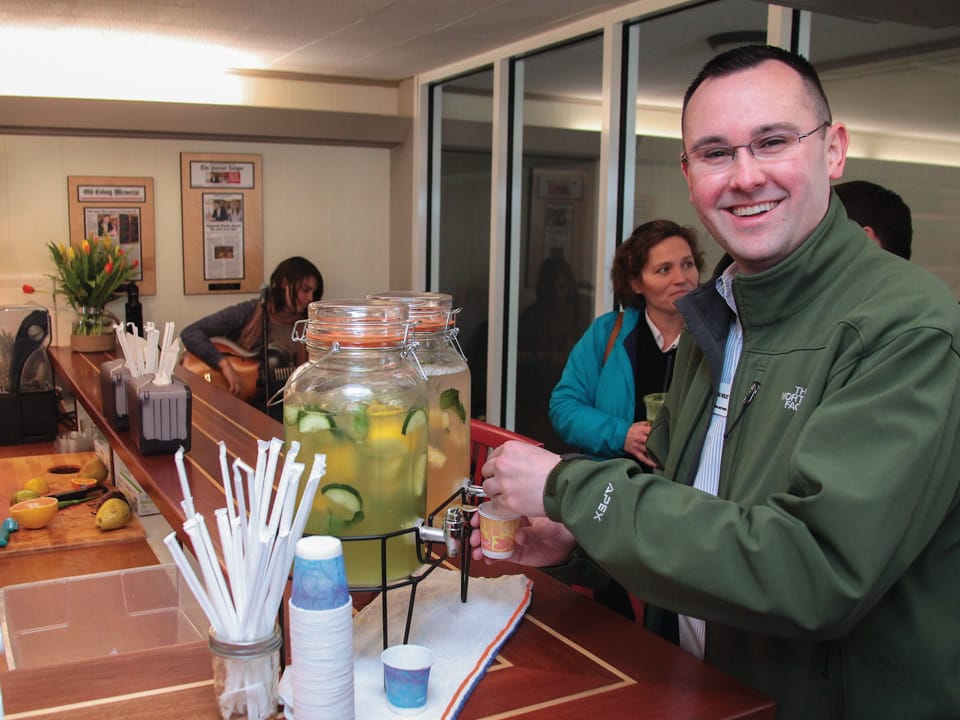Whether it’s our work to conserve habitats for shorebirds or to establish sustainable practices at small businesses, Manomet’s success is directly related to our partners. Andrea O’Brien, Director, Business Sustainability Program & Business Advisor for the New Hampshire Small Business Development Center (NH SBDC), is an example of a strong partner who is accomplishing big things! Andrea has worked with Manomet on both the U360 and the Grocery Stewardship programs. Her role helping NH SBDC clients across the state form stronger companies by identifying the company’s risk of environmental and business resiliency and promoting sustainability protocols and practices has made her a natural fit with Manomet’s Sustainable Economies work.
Andrea shared with us how her work with Manomet has evolved:
 How did you first become involved with Manomet?
How did you first become involved with Manomet?
Manomet first came to my attention when they launched Root 360, their on-line business assessment tool designed to help businesses assess their management practices under the umbrella of sustainability principles. This tool is a good resource for businesses looking to start their journey of improving their management strategies to become more sustainable.
The main focus and overarching mission of the NH SBDC is to provide no-cost, confidential, one-on-one business management advising to existing companies and startups. Our objective is to help our clients reach their business goals. As director of the NH SBDC’s Business Sustainability Program, I believe it is important to advise and educate our clients how using the principles of sustainable business management strategies can enhance the value of their company and increase their bottom line; the Root 360 is a great tool to help start the discussion on sustainability.
Like many technical assistance organizations, the NH SBDC understands the importance of partnering with like-minded organizations like Manomet and leveraging available resources to better serve the small business community.
Since my first contact with Manomet, I have partnered with them to help businesses advance their sustainability practices; specifically, on the Grocery Stewardship Certification Program. This program assists grocers identify sustainability practices to improve their bottom line. Additionally, NH SBDC has worked with Manomet to promote the U360 program that enables student interns to work directly with businesses in using the Root 360 tool.
What are the key challenges facing small businesses today?
Small businesses can experience a variety of challenges: recruiting and retaining a qualified workforce, accessing capital to grow, managing costs and overhead to maximize profitability are just a few. Often owners have to wear many hats and cover many bases so it is increasingly important to create strategies that maximize efficiencies. In terms of sustainable business practices, reducing waste and increasing energy efficiency are important tools for business owners to think about. The principles of sustainability require a business to be well aware of how the cash flows through their business, looking closely at how resources are managed and how it impacts the bottom line. In this competitive environment, businesses have a lot to lose if they cannot measure and manage this.
Why is sustainability important for small businesses?
Sustainability principles in business management are important because they help the owner/management team overcome some of the challenges they face. Pursuing a sustainable operation enables the owner to look at current business practices and assess their impact on their bottom line. Sustainable business strategies allow business owners to integrate best management practices (BMPs) into their business and decision making for marketing/branding, resource management, and customer relations. Sustainable business practices can be summed up this way: A business that pays attention to sustainable business management strategies (BMPs) uses their values to create value and enhance their bottom line by increasing their efficiency, minimizing waste, and raising their customer/employee/community loyalty.
Is there anything else you’d like to share?
There is an increasing expectation that businesses in our community are not only there to provide a service and make a profit, but they could also contribute to the community and be a force for social change. As millennials take the lead in consumer spending, business will want to create a brand that speaks to their values (and the values of all their customers); following sustainable BMPs will help business achieve that goal.
If we were to ask a small business owner how to use sustainable management strategies in their operations they may not know where to begin. So tools like Root 360 and the B Corp Certification standards will be a good starting point for business looking to embrace sustainable business practices. To get assistance in establishing sustainable business practices, business owners should tap the expertise at an SBDC office in their region.





 Back to all
Back to all


